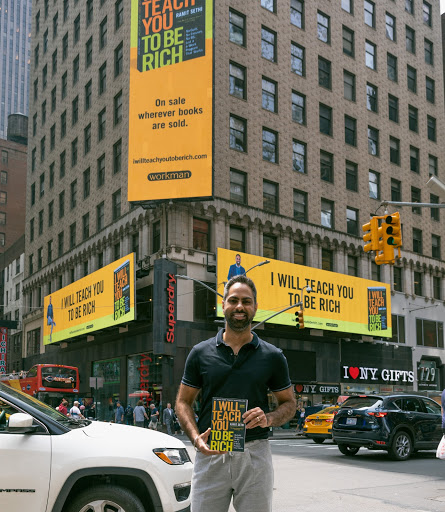Well, The New York Times just reviewed my book.
10 years ago, when my first edition was coming out, I asked my friend at the Times how to get my book reviewed. He came back and said,
“It’s not gonna happen.”
I laughed. The unspoken message was clear:
“You’re not important enough.”
Truthfully, they were right. I was a nobody. Even though I had an audience and some media hits, for the personal finance media-industrial complex, I was a newbie. A rookie. Not battle-tested against the many self-development “gurus” who come and go every other year.
10 years later, it’s hard to deny that the impact that the I Will Teach You To Be Rich philosophy has had.
Millions of people have now read about spending extravagantly on the things you love. You routinely hear people talking about Big Wins, Conscious Spending, and Invisible Scripts. You see people proudly posting the amazing experiences they paid for — vacations, amazing dinners, paying off debt years ahead of schedule — using the techniques in my book. Many have started their own businesses using our courses.
I’m grateful for this book review. I take it as one more sign this Rich Life movement is touching lives and growing every day.
My life has changed a lot over the past 10 years, too. I got married. I grew my business with the help of an amazing team. I learned what really matters to me.
What I’m most proud of is that I did it MY WAY. I stayed true to IWT principles. I still read every email and DM you send me (and I respond to as many as I can).
I still believe money can be FUN. I know you can use it to say YES instead of worrying about all the things you should say NO to.
I still prohibit anyone with credit card debt from joining our flagship program, a decision that has personally cost me millions of dollars.
And because of that trust, I get hear about the stories and things people really care about: earning more, how to handle our parents getting older, love & money.
Paul B. Brown, the Times reviewer, did a fine job. He likes my concept of Big Wins and Conscious Spending. He also likes how I push people to be specific about what their Rich Life really is. He doesn’t love some of the the tone of the book.

Times Square, NYC
I think that’s a fair critique. My tone isn’t for everyone.
The more I’ve been writing about money and business and psychology, the more I’ve realized one thing:
People crave the truth.
They don’t want random tips on how to choose a bank or credit card. They want to know the exact credit cards that I use and how I squeeze every perk out of them (page 36).
They don’t want some random expert to tell them to “cut back on their spending.” They want to know the exact percentages of what they should be spending (page 140).
They don’t want someone telling you to “have the conversation” with your partner about money. They want to know exactly what to say — down to the exact words to use — to get financially aligned when you’re dating or married (page 292).
The world wants you to be vanilla. They want to polish off your edges, making you sound like everyone else…and the minute you do it, they abandon you.
I refuse to become vanilla.
Ironically, the more I told the truth — the more I ignored the usual “top 5 tips” — the more people wanted to read my philosophies.

For example, I was advised to delete my references to the similarities between food and finances (page 6). Apparently, it’s now taboo in America to suggest people might want to lose weight. I refused. After going on my fitness journey, I now believe even more strongly that you can take control of your food and your money.
(Funny enough, when I posted an Instagram story about my fitness/food, I showed exactly what I eat — down to the gram. It was my most popular story ever.)
I’ve been advised to make my writing more vanilla. To fit into the mainstream. To give “5 tips on saving money by turning your oven light off.” No thanks. This means lots of media orgs won’t cover my material. So be it.
Sometimes, I put that pressure on myself. I remember when I sat down to write new edition of my book, I was working on the new section on crypto. It’d been a long time since I wrote a book. After I wrote for 6 hours, I sat back, re-read it, and tore it up. It was shit. I was equivocating, vacillating…not taking a stand. I sounded like everybody else and I hated my own writing.
When I was young, I could write whatever I wanted. I was fearless. (I was also abrasive, which unnecessarily antagonized some people. That was a mistake. Nobody should ever put down a potentially life-changing book because one line offends them. That was my fault. And I fixed it in the new edition of the book.)
Now, I found myself scared to be that honest. It’s easy when you’re in your mid-20s. Now, I have employees, a wife, readers who scour every single thing I say for errors. I have a lot more to lose.
But I realized, the reason the first book did so well was that I took a stand. Agree or not, you knew exactly where I stood. In life, having a point of view is the most rare thing of all.
(And, of course, you need to be right. For the people who bought my book in March 2009 and followed it, they’re financially set for life.)
So I tore up my first pass at crypto and wrote it again. I fought back against my own urge to be vanilla. This time, I called it like I saw it (page 256). When you read it, you’ll know exactly where I stand.
Through that process, it solidified my belief that facts matter.
Psychology matters.
Specifics matter.
When you write these things, you don’t please anyone. Some people don’t like it. That’s fine.
But even as doors close, new ones open. For example, I’ve become more open about my own finances and my relationship.
On the Tim Ferriss podcast, I talked about the process of signing a prenup and the challenging conversations I had with my wife — including seeing a therapist. We struggled to find answers. Money is taboo. Love and money is even more shadowy. Once we figured it out, I went on Tim’s show to share exactly what happened (with Cass’s blessing)…because nobody else talks about this publicly.
An entire new generation of people in relationships leaned in and started listening.
On my latest Instagram story, I showed you exactly how I travel, down to the specific details. An entirely new group of people who’ve never dreamed of traveling like that leaned in and started watching.
Facts matter.
Psychology matters.
Specifics matter.
This is why I’m grateful for my book to get reviewed in the New York Times.
But truthfully, I’m most proud of growing IWT my way.
No gatekeepers. No intermediaries. Just you and me.
Long ago, I made the decision to go directly to you instead of praying the media would cover me. Through my email newsletter, my blog, my Instagram and Twitter. On book tour and events I throw.

And my podcast interviews, where I can go into detail for hours. (You can hear me going into more detail about the truth of money and psychology on podcasts like The Tim Ferriss Podcast, The Minimalists, Matt D’Avella, Farnoosh Torabi, Noah Kagan, Jordan Harbinger, and James Altucher.)
Ironically, the more I focus on you, the more the media wants to cover me. Today, I’m grateful for the recognition in the New York Times.
But all I’ve ever wanted is to focus on my readers.
Thanks for reading and for being a part of the IWT community.
New York Times Book Review is a post from: I Will Teach You To Be Rich.
Via Finance http://www.rssmix.com/
No comments:
Post a Comment